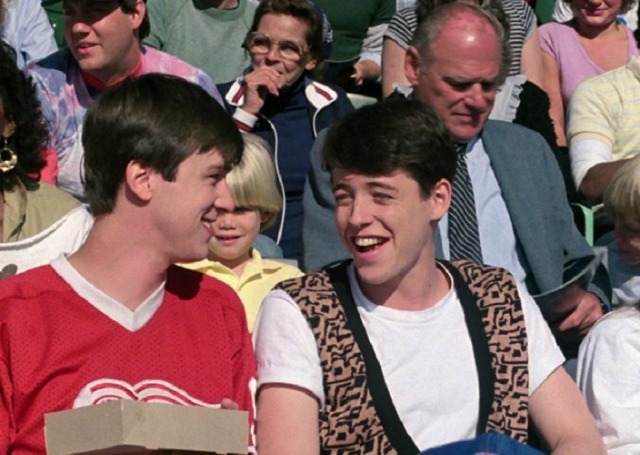Ferris Bueller, Harbinger Of Gentrification?
By Stephen Gossett in Arts & Entertainment on Sep 6, 2016 4:37PM

Image from "Ferris Bueller's Day Off"
Who exactly is Chicago’s proto-urban colonialist? Anyone, anyone? According to a recent essay in City Journal, the waves of gentrification hitting pockets of Chicago were foreshadowed back in 1986 by one famous suburban interloper: Ferris Bueller.
The essay, by Aaron M. Renn, posits that two widely beloved ‘80s movies, The Blues Brothers (1980) and Ferris Bueller’s Day Off (1986), capture a city in transition. The former glimpses Chicago as an industrial “working-class, biracial city,” in tune with a population that was, at the time, 40 percent black. The latter, meanwhile, “presages gentrification, ethnic change, and the decline of black influence in Chicago,” the author argues.
The Blues Brothers, although hardly a model of rigorous realism, captured Chicago’s “essentially biracial” character, Renn argues:
"The Blues Brothers are an R&B band, and the movie boasts cameos from black musical icons such as James Brown, Aretha Franklin, and Cab Calloway. Black-centric institutions such as a South Side church and the legendary Maxwell Street Market feature prominently and reflect a rising Chicago black community that in 1980 was nearing the apex of its influence. The city was then 40 percent black; in 1983, it would elect its first black mayor, Harold Washington. Chicago was then only 14 percent Hispanic, and about half of that population had just recently arrived. The key problem in the city remained that of the color line, but The Blues Brothers offers a fundamentally optimistic take on race relations in Chicago.This vision of an integrated Chicago, however, was true only in the movies. The city was then, and remains today, hyper-segregated and racially polarized… Still, The Blues Brothers accurately depicts a Chicago that was essentially biracial."
Bueller, on the other hand, is something of a romp of white privilege, presaging—if not outwardly depicting—the diminishment of black political authority:
“The film’s suburban milieu is almost entirely white and upscale. The primary divide in this universe remains present in today’s Chicago: that between the comfortable upper middle class (Ferris’s family) and the genuinely wealthy (Cameron’s family). Ferris, Cameron, and Sloane visit a postindustrial, seemingly all-white Chicago. The characters they meet there are white. Yes, we see black people on the streets, but they’re merely part of the scenery. White people are the film’s principal focus. In one of the film’s iconic scenes, Ferris mounts a German-American Steuben Day parade float and performs the Beatles’ “Twist and Shout,” a white band’s cover of a song first made popular by the Isley Brothers, an African-American group. Ferris Bueller accurately predicts the return of white political domination of Chicago.”
It's provocative stuff, to be sure, especially in here in Chicago, where Bueller remains cherished enough to inspire a host of commemorative celebrations. But its not as hot-take-y as it may seem, either. The film definitely portrays Chicago as “a playground for the film’s young people” and the argument that Bueller prefigures a landscape besotted with the young and moneyed isn’t too much of a stretch. How much that correlates with the population loss and demographic shifts outlined by the author are open to interpretation, of course.
In fact, perhaps the essay’s most prominent fault is the criticism it fails to acknowledge: that The Blues Brothers arguably has its own thorny racial baggage. Rolling Stone music critic Dave Marsh wrote at the time of the duo's peak, “The Blues Brothers pander to both nostalgia and the ignorant assumption that black popular culture is some sort of joke.” It’s not a view this author shares, but it’s prominent enough to deserve mention, especially in Renn’s framework.
What do you think? How much validity do you find in Renn's perspective? Is it time for Chicago to take a gimlet-eyed reappraisal of one (or more) of its most dearest pop-cultural artifacts? Anyone, anyone?
[H/T Reddit]